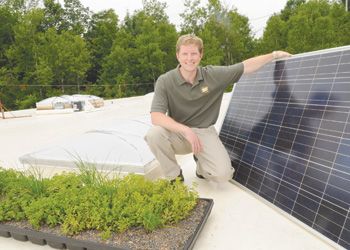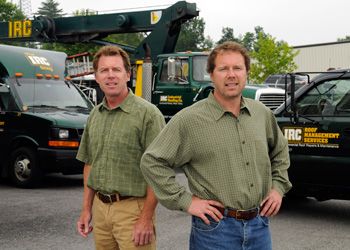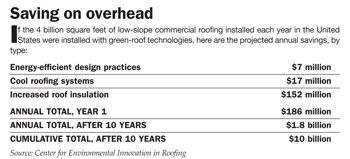Raising the roof | A Lewiston firm finds new ways for businesses to make a buck from the top down
The new Hannaford supermarket in Augusta is being billed as one of the greenest in the nation. On the roof, about 180 solar panels — the largest installation in the state — provide 40 kilowatts of electricity that are either used by the store or sent back into the grid. Accompanying the panels is a 7,500-square-foot green roof, a patch of sedum plants and soil that helps insulate the building and prevent a deluge of stormwater runoff. The white roof keeps the building cooler, and 50 skylights let in natural light, sometimes enough to replace electric lighting.
Hannaford hopes the 50,000-square-foot store will become the first supermarket to earn a platinum LEED certification, the highest level, from the U.S. Green Building Council. But the building has already marked a milestone for another Maine company. The $1 million roofing project is the first major undertaking by The IRC Group’s new solar division. With Solar Roof Systems, the Lewiston-based commercial roofing contractor is marrying the longstanding practices of the trade with new technology.
Started six months ago, the solar division allows the 64-year-old roofing company to branch out into the flourishing field of green construction. Beyond standard roofing construction and maintenance, IRC now offers installation of solar thermal units for generating hot water, solar photovoltaic units for generating electricity, daylighting techniques that maximize natural light and vegetative roofs — projects that have largely fallen to specialty solar companies, electricians or plumbers. “We heard comments that people had checked out solar, but they didn’t want anybody penetrating their roof,” says Mike Davis, the company’s business manager and president of Solar Roof Systems. “Our whole vision was to take care of the whole solution.”
Boosting a building’s energy efficiency has become more important for companies, and new federal tax incentives introduced through the American Recovery and Reinvestment Act have made it more appealing, says Kathleen Newman, president of the Maine chapter of Associated Builders and Contractors. “With the money that’s become available, there are going to be some opportunities for construction companies to break into that, with weatherization and solar offerings,” she says.
IRC is one of the big three roofing companies in Maine, and though it’s not the only roofing company in Maine to tackle green roofs, it is the only one that has created a separate solar division, according to Newman. “Companies like IRC that are ahead of the curve and already have a division are in a great position to really take advantage of those opportunities,” she says.
IRC has already started reaping the benefits. “We’ve had double-digit growth this year,” says Davis. Though today’s relatively stable energy prices have tempered the push for energy efficiency, the company is gearing up for a surge of renewed interest. “The thing that has changed as opposed to the ’70s is that people realize prices will go back up, it’s not just a short-term dip,” Davis says. “We’re already seeing a healthy business even at these prices, so when oil goes through the roof we’ll be poised for some real significant growth.”
A trek toward solar
The IRC Group began in 1945 as Bill’s Roofing and Siding, a residential roofing company in Auburn founded by Bill St. Hilaire. Around 1970, the company relocated to its current digs off I-95 in Lewiston. In 1983, brothers John and Rick St. Hilaire, grandsons of the founder, joined the company full time, with John on the operations side and Rick on the sales side. The ’80s recession had left the company struggling, so the brothers went “knocking on doors,” Rick says, drumming up business and working to transition to commercial work. “It was easier for the business to expand into that area,” says John, president of the company’s Industrial Roofing Co. The construction boom of the late ’80s helped propel the company, and in 1989 IRC bought competitor Hill Roofing in Bangor.
In 1990, Rick and John bought the company from their father, just in time for the next recession. Four years after the acquisition, the St. Hilaires were forced to close Hill Roofing amid pay cuts for both the owners and employees. “In some ways, it helped us mature,” says Rick, president of the company’s Roof Management Services division. “It gave us a better perspective on what it takes to operate a successful commercial enterprise, and it gave us more exposure in the marketplace that ultimately helped us take the next big step.”
In the mid-1990s, IRC netted some major projects, including Husky Injection Molding System’s plastics manufacturing plant in Vermont and the National Semiconductor building in South Portland. In 2000, the company launched its Roof Management Services division in response to growing demand for roof upkeep. Since then, the company has done work for Cabela’s in Scarborough, Idexx in Westbrook and Earle W. Noyes and Sons in Portland. In 2007, the company hit another milestone when it paid off its debt. “It freed up capital for us to invest in some high-quality people, like Mike [Davis],” says Rick.
It was at Davis’ urging that IRC established the solar division. An engineer with experience in the paper industry, Davis saw the benefit of helping businesses find ways to lower their overhead, especially during tight economic times. “Your roof is an asset. It’s a space you can generate income from,” he says. By analyzing a business’s energy use and various incentives like tax breaks, IRC can recommend solar products that would suit a company’s needs and maximize economic return. “We look at an individual property and match them with something that makes economic sense to use it as an asset to make businesses more competitive,” Davis says.
The approach is gaining traction in the roofing industry, as more contractors look for ways to augment their traditional services with solar and green roof products, according to Thomas Gunning, executive director of the North East Roofing Contractors Association, based in Braintree, Mass. Many of the association’s 450 members have expressed interest in growing the energy efficiency side of their businesses, a trend that has “evolved over the last two years,” Gunning says. In fact, the association recently joined the Center for Environmental Innovating in Roofing, a national group founded in March 2008 by the National Roofing Contractors Association to educate the roofing industry on how to incorporate environmentally responsible practices.
So far, IRC’s solar division has handled a little more than a dozen projects, most of those daylighting — adding specially designed skylights that let in diffuse natural lighting. And with the Hannaford project, the division is picking up speed: A hotel in southern Maine, which Davis wouldn’t name, is looking to get a solar thermal installation that would help offset the cost of heating water. The company hopes to use its new solar division to break into the hospitality market, a segment it hasn’t focused on much yet.
To take on solar projects, IRC has started training employees through Efficiency Maine certification courses and programs offered through the manufacturers the company is working with, as well as LEED test prep courses offered through the Maine ABC. So far this year, IRC has hired 12 new employees. “The downturn has been a significant advantage for us,” says Davis. “We’ve been able to hire experienced people, and our turnover has dropped significantly. People realize we have work and we’re growing.”
IRC’s employees are getting field training right at their headquarters. The company is in the midst of renovating 10,000 square feet of its 25,000-square-foot warehouse, outfitting it with nearly all of its new solar offerings, including a white-painted roof to deflect sunlight and a dozen skylights and automated daylighting, so lights only turn on when sunlight is low. The roof will also hold a small photovoltaic system for generating electricity and a vegetative roof. Installed on the outside wall of the building will be a new product the company is introducing, a metal wall that pulls air in from the outside and uses the sun’s rays to heat it up. Called a solar wall, the technology is popular in Canada but hasn’t gotten much hype in the United States. It will be supplemented when necessary with a boiler that burns waste oil from the company’s 40 trucks. “It’s going to be a net zero space,” Davis says. When finished in the next two months, the warehouse will showcase the benefits of solar technology to potential customers.
Divisions poised for growth
Though the recession has helped IRC gain a competitive edge in employee recruitment and retention, it hasn’t all been good. As the construction industry has contracted, competition has become tighter, says Davis. “We see competitors lowering prices because they don’t have work,” he says. “We focus so much on operations, and we try to be the most efficient, the safest and keep cost as low as possible. We may not always be the cheapest, but we try to provide the best value and the best investment.”
IRC plans to grow the company’s name in the roofing industry by forging relationships with customers, says John. “Where we see success is forming a team with customers and with contractors. We want a general contractor to go to a customer and say, ‘Here’s the team we have, these are the contractors you want on your job.’”
IRC also sees untapped potential in its roof management division, since only about 15% of IRC’s 2,000 customers use the company’s maintenance services. “We could easily branch out geographically, but in Maine there are a vast majority of business owners who don’t realize how much money they can save by maintaining their roofs,” says Rick. “It can save hundreds of thousands of dollars. It’s a really growth area.”
Though IRC has navigated through turbulent times, its three presidents say the company is better positioned than ever to not only extend the life of commercial roofs, but allow businesses to leverage them for growth. “When you properly design and install, then maintain it, a roof can last up to 35 years,” says Rick. “And with the possibility of turning it into a working asset by offering alternative energy products and services, we’re changing the whole way of looking at a commercial roof.”
Mindy Favreau, Mainebiz staff reporter, can be reached at mfavreau@mainebiz.biz.













Comments